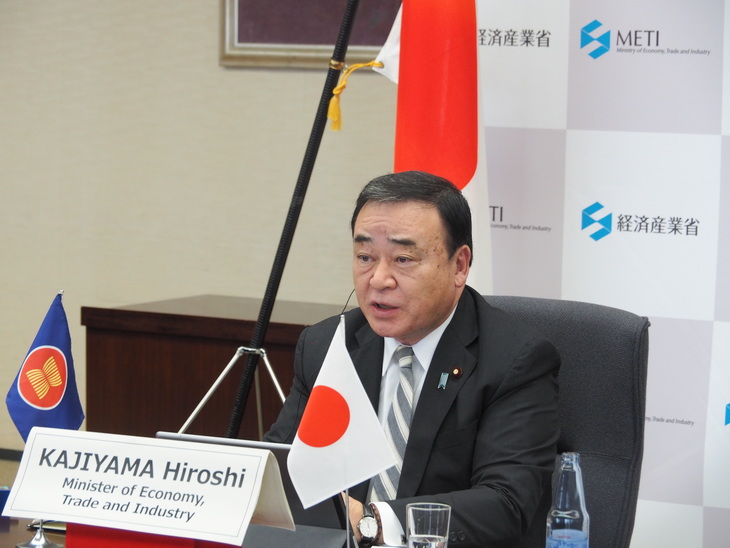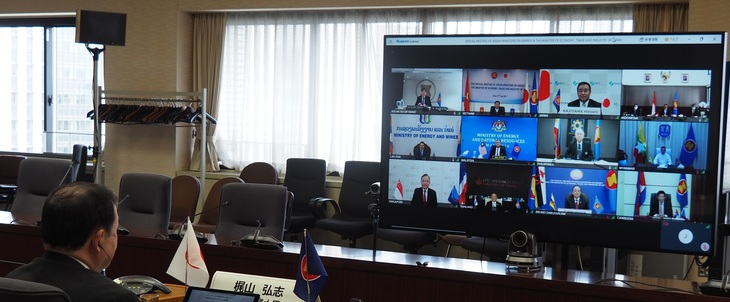June 21, 2021
On June 21 (Mon.), 2021, the Special Meeting of ASEAN Ministers on Energy and Minister of Economy, Trade and Industry of Japan was held online. The meeting was chaired by H.E. Mr. Nguyen Hong Dien, Minister of Industry and Trade of Viet Nam, and co-chaired by Mr. Kajiyama Hiroshi, Minister of Economy, Trade and Industry.
In the meeting, Minister Kajiyama stressed the importance of steadily promoting realistic energy transitions that utilize a wide range of options that reflect the different circumstances of each country, in order to achieve carbon neutrality throughout the world. Minister Kajiyama also proposed the “Asia Energy Transition Initiative (AETI)”; a comprehensive support initiative by Japan for energy transition in Asia, which was welcomed by ASEAN countries and others.
The meeting was held for the first time via video conference, hosted by Japan, and discussions were held on energy transitions in Asia toward the realization of carbon neutrality and Japan’s support initiative.
At the meeting, Minister Kajiyama emphasized that in order to achieve carbon neutrality throughout the world, including developing countries, it is important to steadily promote energy transitions that utilize a wide range of sources and technologies that reflect the different circumstances of each country, and in particular, to promote decarbonization in Asia, where energy demand is expected to grow. Minister Kajiyama emphasized that it is essential to employ various forms of pragmatic energy transitions utilizing all energy sources and technologies and to take into account the differences in geographical characteristics and development stages of each country.
Following this, Minister Kajiyama proposed the “Asia Energy Transition Initiative (AETI)” as a comprehensive support measure for energy transitions provided by Japan. Japan has long stressed the importance of realistic energy transitions based on the different circumstances of each country and advanced its policy to comprehensively support developing countries in their policies and efforts to achieve such transitions, with the aim of realizing global decarbonization.
Asia Energy Transition Initiative (AETI)
- Support for formulating energy transition roadmaps toward implementing carbon neutrality
- Presentation and promotion of Asian version Energy Transition Finance
- US$ 10 billion financing support for renewable energy, energy efficiency, LNG and other projects
- Support for development and deployment of technology, utilizing the achievements of a 2 trillion yen fund
- Human resource development, knowledge sharing and rule-making on decarbonization technologies
At the meeting, each country welcomed Japan’s initiative, including Minister Kajiyama’s proposal, and a joint statement “Enhancing Partnership in Realising Energy Transitions in ASEAN”, which was adopted in the meeting, also included the following contents of the proposal.
The outline of the joint statement “Enhancing Partnership in Realising Energy Transitions in ASEAN”
- The meeting welcomed further collaboration between ASEAN and Japan, including with the Economic Research Institute for ASEAN and East Asia (ERIA).
- The meeting recognized that the ASEAN Member States are at various stages of economic development and faced with differing geographical conditions, in order to better prepare for the realization of energy transitions.
- The meeting noted the unique energy policies of each country, which address energy security, economic competitiveness and environmental sustainability based on each country’s circumstances.
- The meeting recognised the energy transition strategies, including but not limited to the expansion of multilateral power trading; the development of a common ASEAN gas market; the optimisation of the role of Clean Coal Technology (CCT) and Carbon Capture, Utilisation, and Storage (CCUS); the enhancement of energy efficiency and conservation measures in various sectors; the acceleration of renewable energy deployment; the advancement of regional energy policy and planning for energy transition and resilience; and the development of human resource capacity and other capabilities in nuclear power generation.
- The Meeting noted the need to improve the utilisation of all energy sources, technologies, information, expertise, and related policies to meet the growing energy demand in ASEAN.
- The Meeting affirmed the necessity of adequate financing to support the realisation of energy transitions in the region. The Meeting welcomed Japan’s “Asia Energy Transition Initiative (AETI)”, which includes a wide range of support for energy transitions in ASEAN, such as the proposed Asia CCUS Network, and studying the details of the Asia Energy Transition Finance concept.
- The Meeting noted Japan’s initiative to convene the Asia Green Growth Partnership Ministerial Meeting in October 2021.
Japan will steadily implement various activities and projects for energy transitions toward the realization of carbon neutrality in cooperation with ASEAN countries, in addition to actively disseminating information on the importance of steady transitions toward the realization of carbon neutrality throughout the world and launching efforts to support such transitions through various opportunities in cooperation with these countries.



